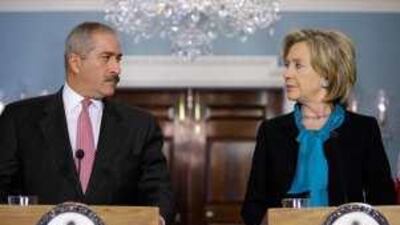RAMALLAH // The PLO yesterday rejected the latest US bid to bring Palestinians and Israelis back to the negotiating table after a spokesman said talks would not start until Israel implemented a full settlement construction freeze in occupied territory. On Friday, the US had laid out its latest effort to bring Palestinians and Israelis back around the negotiating table by proposing the sides first tackle borders and Jerusalem, two of the main issues, as a way to start resolving all outstanding issues and circumvent the Palestinian demand for a total settlement construction freeze.
Speaking after meeting the foreign ministers of Jordan and Egypt, Hillary Clinton, the US secretary of state, said all parties know what a two-state solution entails and by addressing borders and Jerusalem first, other issues would fall into place. "Resolving borders, resolves settlements. Resolving Jerusalem, resolves settlements," she said. "I think we need to lift our sights and instead of looking down at the trees, we need to look at the forest."
But the Palestinian side is yet to be budged from its position that a full Israeli settlement construction freeze needs to be implemented before negotiations can start. Yesterday, Saeb Erekat, the PLO's chief negotiator, again reiterated that position, telling Agence France-Presse that a "return to negotiations requires the complete halt of settlements". Israel instituted what it called a settlement freeze back in November, but that excluded settlement construction in East Jerusalem, which Israel unilaterally annexed in 1967, construction for buildings deemed essential for the public good in settlements generally, as well as 3,000 housing units already approved elsewhere in the West Bank.
While the US initially welcomed the move, the Palestinians - who consider settlement construction a way for Israel to create facts on the ground that pre-empt the outcome of negotiations - remain completely unimpressed. Even Israeli officials have taken to referring to a settlement construction "slowdown" rather than freeze. Nevertheless, the pressure is mounting on Mahmoud Abbas, the PLO chairman. Crucially, both Jordan, whose foreign minister, Nasser Judeh, on Friday expressed his support for the US initiative, and Egypt, whose foreign minister Ahmed Aboul Gheit also met Mrs Clinton on Friday, are now actively pushing the Palestinians to return to the table.
Privately, Palestinian officials concede that a return to negotiations is possible without a complete settlement freeze if the US will guarantee that the final outcome of such negotiations is a state on the 1967 borders with only minor adjustments. Washington's envoy to the region, George Mitchell, is expected to go to Europe this week to brief leaders there on Washington's latest effort. He is understood to be carrying letters of guarantee to both sides to entice them back to the table. Reportedly, these would include a guarantee to the Palestinians that a future state will be based on the 1967 borders.
Israel, meanwhile, will be promised that "demographic changes" be taken into account in any negotiated solution, or, in other words, that some settlements in occupied territory will be annexed to Israel. Whether such letters of guarantee will be enough for Mr Abbas to return to negotiations is an open question. Arab pressure will be hard to resist and could even provide political cover for what would be an unpopular decision. Nevertheless, Mr Abbas thought he had US support for a settlement freeze and may well not trust Washington's motives in pushing the sides back to negotiations.
Certainly, observers hold out little hope for negotiations should they resume under the current political situation. The Palestinians remains divided between Hamas in Gaza and the Fatah-led West Bank, while the Israeli coalition government contains several parties adamantly opposed to any territorial compromise with the Palestinians. "The US is only looking for conflict management at this particular juncture," said Mahdi Abdul Hadi, a Jerusalem-based analyst.
Moreover, said Mr Abdul Hadi, for Mr Abbas to agree to negotiate absent a unity agreement with Hamas would be impossible. "As long as there is no Palestinian reconciliation, Abbas cannot go and sit with Netanyahu. And the Palestinians will continue to be divided." @Email:okarmi@thenational.ae

